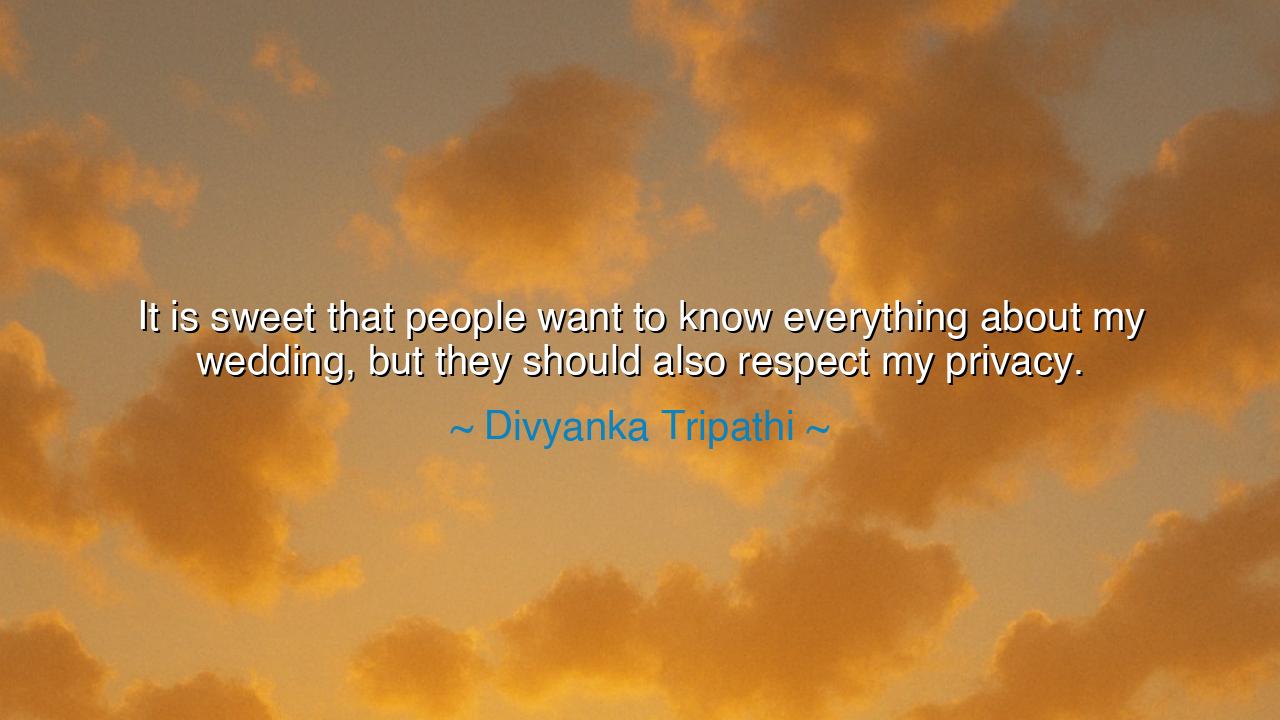
It is sweet that people want to know everything about my
It is sweet that people want to know everything about my wedding, but they should also respect my privacy.






The words of Divyanka Tripathi—“It is sweet that people want to know everything about my wedding, but they should also respect my privacy.”—are both tender and resolute. They reveal the dual nature of love celebrated in public: it warms the heart to see others rejoice in your joy, yet it burdens the soul when curiosity intrudes upon what is sacred. The wedding is not merely a spectacle for the eyes of strangers; it is the covenant of two souls, deserving of reverence and guarded silence.
The sweetness she acknowledges comes from the truth that community has always surrounded the wedding ritual. From ancient villages where all gathered to sing and dance, to kingdoms where entire cities feasted for days, marriage has never been a solitary act. To share joy with others is noble and good. Yet when sharing turns into intrusion, when celebration turns into scrutiny, the sanctity of the union is threatened.
History offers the tale of Helen of Troy, whose beauty and marriage became the subject of relentless public fascination. Her private covenant was torn open for the gaze of nations, and from that violation came war and ruin. The lesson endures: when the private bond of marriage is consumed by public obsession, peace is lost. Tripathi’s words are a plea for wisdom—that curiosity must bow before respect, lest it destroy the very joy it seeks to witness.
Her invocation of privacy is not selfishness but protection. Love flourishes in intimacy, where trust may grow unshadowed by the eyes of the multitude. The most radiant moments of a wedding are not always the ones seen in photographs or described in stories—they are the silent glances, the whispered vows, the quiet promises made between two hearts. These are treasures meant for the couple, not for the crowd.
Therefore, O listener, take this truth to heart: celebrate the joy of others, but do not trespass upon their sanctuaries. The wedding may invite you to the feast, but not into every chamber of the heart. Respect the boundary between public rejoicing and private love, for only then will the union be honored rightly. For the greatest gift you can offer the newly joined is not your curiosity, but your reverence.






Hhuykda
I can totally relate to Divyanka Tripathi’s statement. There’s a fine line between sharing exciting personal moments with fans and maintaining personal privacy. While it’s flattering that people are interested in her wedding, it’s also vital to keep certain things private. How do celebrities find that balance? Should we, as fans, also work on respecting the boundaries of celebrities, even when their lives are in the public eye?
PDPham Phuc Dat
Divyanka Tripathi raises a valid point about privacy in the public eye. It’s understandable that people are curious about her wedding, but respecting her privacy is equally important. It’s a delicate balance that many public figures struggle with. How do celebrities deal with the constant pressure to share? Is there a way to be transparent with fans without compromising personal boundaries, or is it impossible to fully satisfy both sides?
LNanh le nguyet
Divyanka Tripathi’s comment sheds light on the uncomfortable reality of fame. The constant public interest in personal moments like weddings can be overwhelming, even though it’s flattering. How do celebrities navigate this attention? Is there a way to engage with their fans while also maintaining a healthy level of privacy? What steps can they take to ensure their personal lives are respected without alienating those who admire them?
VH08.Nguyen Van Hieu
I completely agree with Divyanka Tripathi’s sentiment here. It’s lovely when fans express genuine curiosity, but privacy should be prioritized. It makes me think—why do we feel the need to know every detail of a celebrity’s personal life? Can there be a balance between honoring their privacy and satisfying our curiosity? How do we, as an audience, respect the privacy of those who entertain us while still feeling connected to them?
BVminh bui van
Divyanka Tripathi’s response is completely understandable. It’s sweet that people want to know more about her wedding, but it’s essential to respect her privacy. The question then becomes—how do public figures decide what’s okay to share and what should remain private? Is it possible to create a healthy boundary between sharing with fans and maintaining personal privacy, or do public expectations always push that line?